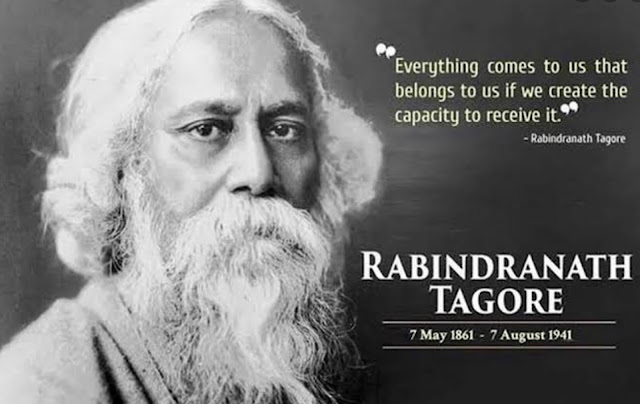This story can be read on The website of The Borderless Journal
Tagore (1861 to 1941) was born in Calcutta, Indian into a family whose wealth and life style can now only be seen in movies. His father owned an estate so huge that at one point in his life Tagore traveled through it on a luxurious barge and was met on the river bank by tenants paying token rents to him. Tagore was raised mostly by servants as his mother died young and his father was very busy administrating the vast estates he owned. Tagore was educated in classical Indian literature and at age eight began to write poetry and ended up reshaping the Bengali Language. Later in his life he founded a school and devoted himself entirely to his writing and teachings. His moral authority became so great that he was able to write the national anthems of both India and Bangladesh, give Gandhi the title of Mahatma (teacher), and in fact in his life had a status as a moral leader on a par with Gandi. He traveled to England and met William Butler Yeats, Ezra Pound and other notable literary figures. This was in a period when western writers were fascinated by Indian thinkers and Yeats wrote the preface for one of his first translations in English. He is considered prior to WWII and perhaps even now the most widely read Indian author both in the west and in India. Einstein said he profited greatly from his conversation on metaphysics with Tagore, Gandhi came to him for moral counseling. In 1915 he was knighted by George the V but he repudiated his knighthood following the 1919 Jallianwata Massacare. He was a strong advocate of the end of British rule in India.
William Butler Yeats and his wife attended a series of lecturers Tagore gave in London. Yeats was fascinated by Tagore. Georgie Yeats was touched on such a deep level by Tagore that he appeared as a kind of spokesman in her automatic writing and this helped shaped the mature poetic vision of Yeats
There is no literary tradition older than that of India. There are speculative reasons to think there was an oral literary culture in Ireland 5000 years ago (about the same time that Indian literary culture arose). The difference is that in India there is an unbroken chain from the works of Salmon Rushdie back 5000 years but in Ireland the chain is broken and we have no sources. I also think, getting off topic a bit, that the roots of magic realism go back to very old Indian literature.
There are now just over 3800 posts on The Reading Life, the nine posts i have previously done on a Short Story by Tagore are often among the top ten most viewed posts in a week.
I found this a very moving story about a Young man, living with his aunt as his parents have passed, who is deeply bonded with nature. His description evokes ancient traditions:
“Even at an early age, he’d quietly observe Nature around him. The dark, billowing clouds in layers, on the eastern sky would collect and pour. They would moisten his heart and bring forth the untamed breeze of the forests. It was, as if, his entire being could hear the pitter-patter of the rain.
He seemed to want to fill his being with rays of the departing sun, perhaps, in an attempt to collect something precious from it. In the end of Magh (the month of January), when the trees would be laden with the tiny fruits, an intrinsic, deep happiness, a joy defying description awakened in him. His inner nature would blossom forth, expand and take on a deeper shade of colour, much like those flowering Sal trees, with the advent of Falgun (the month of February). In those moments, he had a deep urge to sit in solitude, in conversation with himself, piecing together the various tales he’d heard. Like the story of that very old pair of birds, who had made their nest in the deep crevice of the ancient banyan tree. He never talked much, this wide-eyed, staring boy. In the silence of his being, his thoughts ran deep.”
“Bohai” would me a very good first Tagore. I offer my thanks to Borderless Journal for making it
possible to read this beautiful story.
I offer my thanks to Mitali Chakravarty for Publishing this story
She is the founding editor of the Borderless Journal.
Mitali Chakravarty has been writing from the age of eight. She started her professional career as a journalist in The Times of India. Her bylines have appeared in The Statesman, The Times of India, The Hindustan Times, The Pioneer, The Daily Star and more journals. Her poetry and prose have been published online and as part of numerous hardcopy anthologies. Some of her poetry has been translated to Nepali and German. Mitali also translates from Bengali and Hindi to English. She has published a humorous book of essays on living in China where she spent eight years, In the Land of Dragons . From borderlessjournal.COM
I took a long look at The Borderless Journal. It already has lots of Short stories i hope to read and much more in just a few months of publication .
Here is their Mission Statement
“Borders were drawn through history dividing mankind into smaller more manageable divisions that could be ruled and led. Borderless is a celebration of the human spirit that soars exploring and developing links beyond all the borders that exist in today’s world.
It is a literary journal to connect all writers and readers beyond the bonds of money, nationality, rituals and cultures… to a world of ideals. We look for any positive input — humour, poetry, prose. There are no boundaries to human imagination and thought and that is what we are set to explore”
Mel u






No comments:
Post a Comment